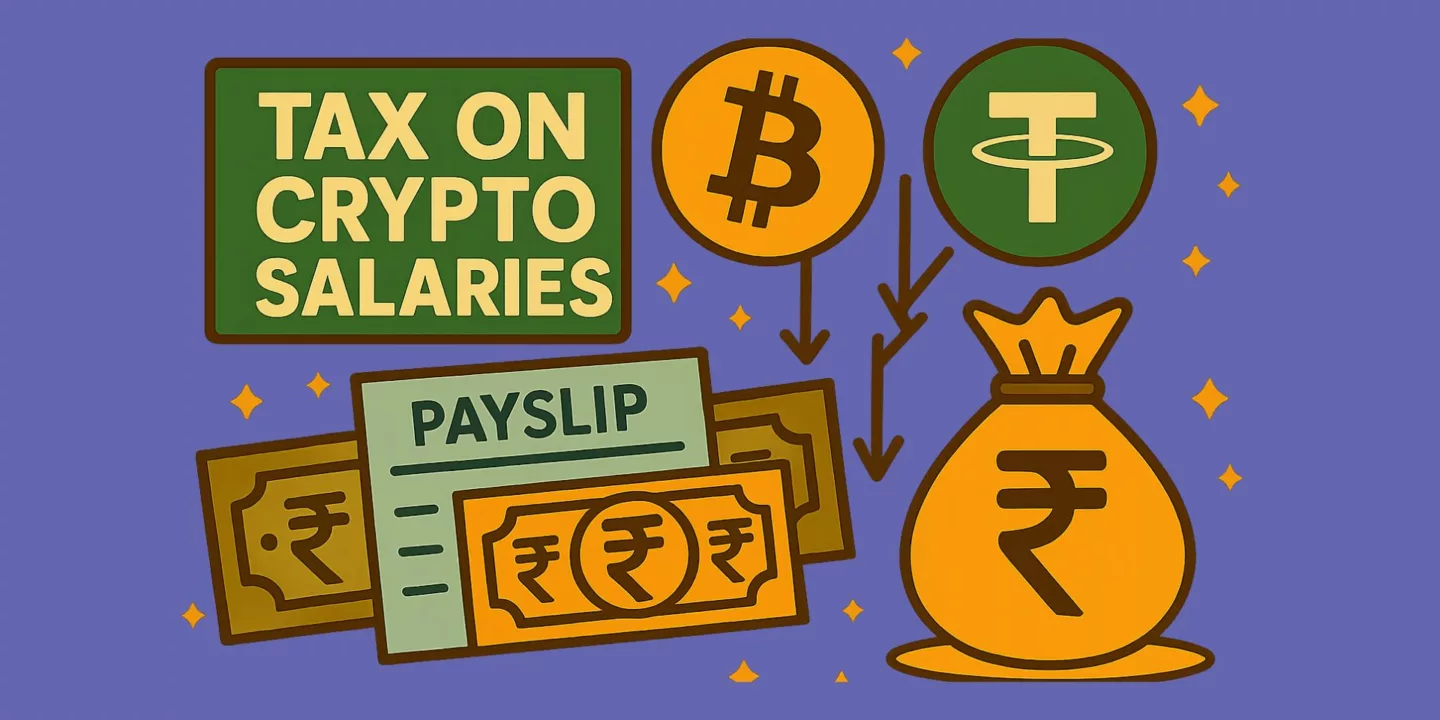As digital assets continue to gain traction, many professionals in India are now receiving their salaries in cryptocurrencies, including stablecoins like USDT. While this mode of compensation offers flexibility and global accessibility, it also brings forth unique tax implications. This comprehensive guide delves into how the Indian tax system treats crypto salaries and provides clarity on the taxation of stablecoin payments.
Understanding Crypto Salaries in India
In India, cryptocurrencies are classified as Virtual Digital Assets (VDAs) under Section 2(47A) of the Income Tax Act. This classification encompasses all forms of crypto assets, including tokens, NFTs, and stablecoins. Receiving a salary in crypto is treated similarly to receiving it in INR, with specific tax treatments based on the nature of the transaction.
Taxation Framework for Crypto Salaries
The taxation of crypto salaries involves two primary components:
1. Income Tax at the Time of Receipt
When an individual receives a salary in cryptocurrency, the Fair Market Value (FMV) of the crypto on the date of receipt is considered as income. This amount is taxed according to the individual’s applicable income tax slab.
Example:
Consider Arjun, a blockchain developer who receives 0.01 BTC as his monthly salary. On the day of receipt, 1 BTC is valued at ₹73,00,000.
Therefore, Arjun’s taxable income for that month is ₹73,000. This amount will be taxed based on his income slab rate.
2. Capital Gains Tax on time of sale
If the received cryptocurrency is later sold, exchanged, or used for purchases, any profit arising from the transaction is subject to a 30% flat tax under Section 115BBH, along with a 4% health and education cess.
Additionally, a 1% Tax Deducted at Source (TDS) is applicable on such transactions exceeding ₹50,000 in a financial year, as per Section 194S.
Continuing the Example:
Suppose Arjun sells his 0.01 BTC when the value of 1 BTC rises to ₹80,00,000. His sale proceeds amount to ₹80,000.
His capital gain is ₹7,000 (₹80,000 – ₹73,000). He will owe ₹2,100 as capital gains tax (30% of ₹7,000) and ₹84 as cess (4% of ₹2,100), totaling ₹2,184.
Additionally, a TDS of ₹800 (1% of ₹80,000) will be deducted at the time of sale.
Taxation of Stablecoin Salaries (e.g., USDT)
Stablecoins like USDT are pegged to fiat currencies, aiming to maintain a stable value. Despite their stability, the Indian tax authorities treat them similarly to other cryptocurrencies.
Income Tax on Receipt
Receiving a salary in stablecoins is taxed based on the FMV in INR on the date of receipt. Even though stablecoins aim to maintain a 1:1 peg with fiat currencies, their FMV is determined by their trading value on exchanges at the time of receipt.
Example:
If Raj receives 1,000 USDT as salary and each USDT is trading at ₹82, his taxable income is ₹82,000. This amount will be taxed according to his income slab.
Capital Gains Tax on Disposal
If Raj later converts his USDT to INR or another cryptocurrency and realizes a profit due to exchange rate fluctuations, the gain is subject to a 30% capital gains tax plus cess.
Example:
Suppose Raj converts his 1,000 USDT to INR when each USDT is valued at ₹84. His proceeds amount to ₹84,000, resulting in a gain of ₹2,000 (₹84,000 – ₹82,000). He will owe ₹600 as capital gains tax (30% of ₹2,000) and ₹24 as cess (4% of ₹600), totaling ₹624.
Key Tax Provisions Relevant to Crypto Salaries
- Section 17(1): Defines “salary” to include wages received in any form, including cryptocurrency.
- Section 115BBH: Imposes a 30% tax on income from the transfer of VDAs, with no deductions allowed except for the cost of acquisition.
- Section 194S: Mandates a 1% TDS on the transfer of VDAs exceeding specified thresholds.
Practical Considerations
- Record-Keeping: Maintain detailed records of the date, amount, and FMV of crypto received as salary.
- Tax Filing: Report crypto income under the appropriate sections in your Income Tax Return (ITR), specifically under Schedule VDA.
- TDS Compliance: Ensure that TDS is appropriately deducted and deposited when disposing of crypto assets.
Conclusion
Receiving crypto salaries, including stablecoins like USDT, is fully taxable in India. The FMV at the time of receipt is subject to income tax based on the individual’s slab rate, and any subsequent gains from disposal are taxed at a flat rate of 30% plus cess. Proper documentation and compliance with TDS provisions are crucial to ensure adherence to tax laws.
Disclaimer: The information provided in this article is for educational and informational purposes only. Nothing contained herein should be construed as financial, legal, tax, or investment advice. All content, opinions, and views expressed are solely for general information and do not constitute an offer to buy or sell any securities or financial instruments. Tax laws and regulations vary by jurisdiction and may change over time. Cryptocurrency taxation is complex and subject to interpretation. We strongly recommend consulting a qualified tax professional or financial advisor to understand the tax implications specific to your circumstances.






